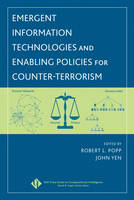Emergent Information Technologies and Enabling Policies for Counter-Terrorism
 -15%
portes grátis
-15%
portes grátis
Emergent Information Technologies and Enabling Policies for Counter-Terrorism
Yen, John; Popp, Robert L.
John Wiley & Sons Inc
07/2006
480
Dura
Inglês
9780471776154
15 a 20 dias
1078
Contributors.
Chapter 1: Utilizing Information and Social Science Technology to Understand and Counter the Twenty-First Century Strategic Threat 1 (Robert L. Popp, David Allen, and Claudio Cioffi-Revilla).
Chapter 2: Hidden Markov Models and Bayesian Networks for Counter-Terrorism (Krishna Pattipati, Peter Willett, Jeffrey Allanach, Haiying Tu, and Satnam Singh).
Chapter 3: Anticipatory Models for Counter-Terrorism (Mark Lazaroff and David Snowden).
Chapter 4: Information Processing at Very High Speed Data Ingestion Rates (J. Brian Sharkey, Doyle Weishar, John W. Lockwood, Ron Loui, Richard Rohwer, John Byrnes, Krishna Pattipati, Stephen Eick, David Cousins, and Michael Nicoletti).
Chapter 5: Analysis of Heterogeneous Data in Ultrahigh Dimensions (R. A. Ammar, S. A. Demurjian , Sr., I. R. Greenshields, Krishna Pattipati, and S. Rajasekaran).
Chapter 6: Semantic Web Technologies for Terrorist Network Analysis (Jennifer Golbeck, Aaron Mannes, and James Hendler).
Chapter 7: Improving National and Homeland Security Through Context Knowledge Representation and Reasoning Technologies (Nazli Choucri, Stuart E. Madnick, and Michael D. Siegel).
Chapter 8: Anonymized Semantic Directories and a Privacy-Enhancing Architecture for Enterprise Discovery (Jeff Jonas and John Karat).
Chapter 9: Facilitating Information Sharing Across Intelligence Community Boundaries Using Knowledge Management and Semantic Web Technologies (Brian Kettler, Gary Edwards, and Mark Hoffman).
Chapter 10: Applying Semantic Web Reasoning to Counter-Terrorism (Paul Kogut, Yui Leung, Kathleen M. Ryan, Linda Gohari, Mieczyslaw M. Kotar, and Jerzy J. Letkowski).
Chapter 11: Schemer: Consensus-Based Knowledge Validation and Collaboration Services for Virtual Teams of Intelligence Experts (Clifford Behrens, Hyong-Sop Shim, and Devaisis Bassu).
Chapter 12: Sharing Intelligence Using Information Supply Chains (Shuang Sun, Xiaocong Fan, and John Yen).
Chapter 13: Supporting Knowledge Management In Emergency Crisis Management Domains: Envisioned Designs for Collaborative Work (Michael D. McNeese, Isaac Brewer, Rashaad E. T. Jones, and Erik S. Connors).
Chapter 14: Agent-Based Simulations for Disaster Rescue Using the DEFACTO Coordination System (Janusz Marecki, Nathan Schurr, and Milind Tambe).
Chapter 15: Transcending the Tower of Babel: Supporting Access to Multilingual Information with Cross-Language Information Retrieval (Douglas W. Oard).
Chapter 16: Journey from Analysis to Inquiry: Technology and Transformation of Counter-Terrorism Analysis (Aaron B. Frank and Desmond Saunders-Newton).
Chapter 17: Behavioral Network Analysis for Terrorist Detection (Seth A. Greenblatt, Thayne Coffman, and Sherry E. Marcus).
Chapter 18: Detecting Terrorist Activities in the Twenty-First Century: A Theory of Detection for Transactional Networks (Tom Mifflin, Chris Boner, Greg Godfrey, and Michael Greenblatt).
Chapter 19: Social Network Analysis Via Matrix Decompositions (D. B. Skillicorn).
Chapter 20: Legal Standards for Data Mining (Fred H. Cate).
Chapter 21: Privacy and Consequences: Legal and Policy Structures for Implementing New Counter-Terrorism Technologies and Protecting Civil Liberty (Paul Rosenzweig).
Chapter 22: Designing Technical Systems to Support Policy: Enterprise Architecture, Policy Appliances, and Civil Liberties (K. A. Taipale).
Index.
About the Editors.
Contributors.
Chapter 1: Utilizing Information and Social Science Technology to Understand and Counter the Twenty-First Century Strategic Threat 1 (Robert L. Popp, David Allen, and Claudio Cioffi-Revilla).
Chapter 2: Hidden Markov Models and Bayesian Networks for Counter-Terrorism (Krishna Pattipati, Peter Willett, Jeffrey Allanach, Haiying Tu, and Satnam Singh).
Chapter 3: Anticipatory Models for Counter-Terrorism (Mark Lazaroff and David Snowden).
Chapter 4: Information Processing at Very High Speed Data Ingestion Rates (J. Brian Sharkey, Doyle Weishar, John W. Lockwood, Ron Loui, Richard Rohwer, John Byrnes, Krishna Pattipati, Stephen Eick, David Cousins, and Michael Nicoletti).
Chapter 5: Analysis of Heterogeneous Data in Ultrahigh Dimensions (R. A. Ammar, S. A. Demurjian , Sr., I. R. Greenshields, Krishna Pattipati, and S. Rajasekaran).
Chapter 6: Semantic Web Technologies for Terrorist Network Analysis (Jennifer Golbeck, Aaron Mannes, and James Hendler).
Chapter 7: Improving National and Homeland Security Through Context Knowledge Representation and Reasoning Technologies (Nazli Choucri, Stuart E. Madnick, and Michael D. Siegel).
Chapter 8: Anonymized Semantic Directories and a Privacy-Enhancing Architecture for Enterprise Discovery (Jeff Jonas and John Karat).
Chapter 9: Facilitating Information Sharing Across Intelligence Community Boundaries Using Knowledge Management and Semantic Web Technologies (Brian Kettler, Gary Edwards, and Mark Hoffman).
Chapter 10: Applying Semantic Web Reasoning to Counter-Terrorism (Paul Kogut, Yui Leung, Kathleen M. Ryan, Linda Gohari, Mieczyslaw M. Kotar, and Jerzy J. Letkowski).
Chapter 11: Schemer: Consensus-Based Knowledge Validation and Collaboration Services for Virtual Teams of Intelligence Experts (Clifford Behrens, Hyong-Sop Shim, and Devaisis Bassu).
Chapter 12: Sharing Intelligence Using Information Supply Chains (Shuang Sun, Xiaocong Fan, and John Yen).
Chapter 13: Supporting Knowledge Management In Emergency Crisis Management Domains: Envisioned Designs for Collaborative Work (Michael D. McNeese, Isaac Brewer, Rashaad E. T. Jones, and Erik S. Connors).
Chapter 14: Agent-Based Simulations for Disaster Rescue Using the DEFACTO Coordination System (Janusz Marecki, Nathan Schurr, and Milind Tambe).
Chapter 15: Transcending the Tower of Babel: Supporting Access to Multilingual Information with Cross-Language Information Retrieval (Douglas W. Oard).
Chapter 16: Journey from Analysis to Inquiry: Technology and Transformation of Counter-Terrorism Analysis (Aaron B. Frank and Desmond Saunders-Newton).
Chapter 17: Behavioral Network Analysis for Terrorist Detection (Seth A. Greenblatt, Thayne Coffman, and Sherry E. Marcus).
Chapter 18: Detecting Terrorist Activities in the Twenty-First Century: A Theory of Detection for Transactional Networks (Tom Mifflin, Chris Boner, Greg Godfrey, and Michael Greenblatt).
Chapter 19: Social Network Analysis Via Matrix Decompositions (D. B. Skillicorn).
Chapter 20: Legal Standards for Data Mining (Fred H. Cate).
Chapter 21: Privacy and Consequences: Legal and Policy Structures for Implementing New Counter-Terrorism Technologies and Protecting Civil Liberty (Paul Rosenzweig).
Chapter 22: Designing Technical Systems to Support Policy: Enterprise Architecture, Policy Appliances, and Civil Liberties (K. A. Taipale).
Index.
About the Editors.












